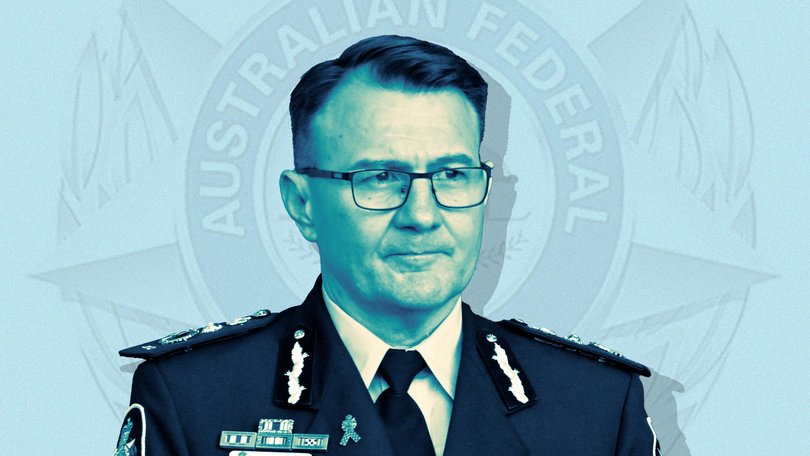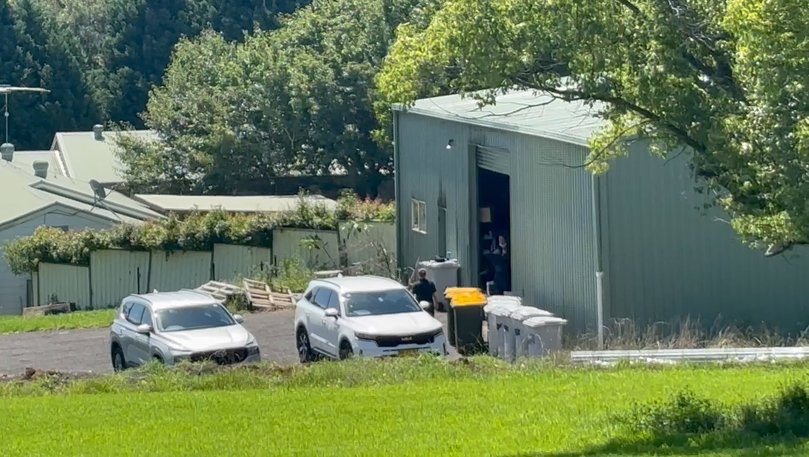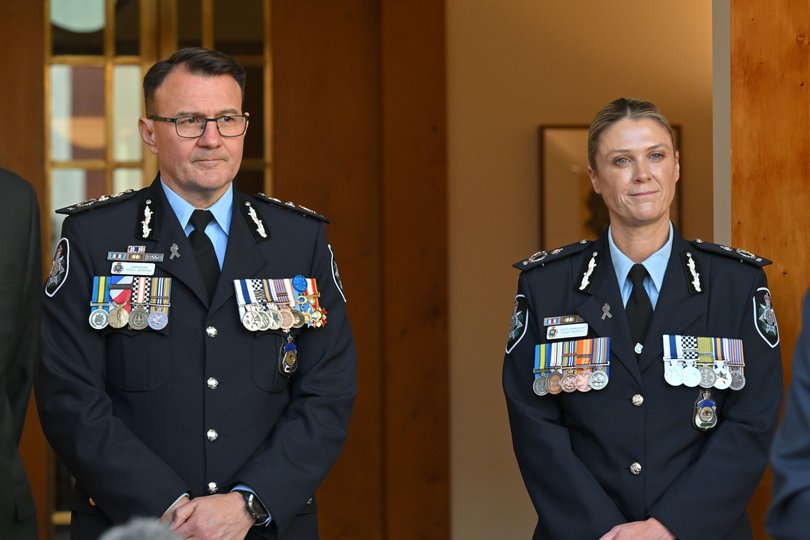Reece Kershaw quits: AFP commissioner reveals decision to exit as Australia’s top cop
AFP Commissioner Reece Kershaw just last year welcomed his reappointment until October 2026. Today he announced his intention to exit the job this year.

AFP Commissioner Reece Kershaw has quit his position in a shock move 18 months before his contract was due to expire, and just six months after the force became embroiled in the Dural caravan fake terror plot.
Commissioner Kershaw is understood to have given just a few weeks notice and will leave by October 3, only saying publicly that as a grandfather he wanted to spend more time with his family.
As rumours flew late on Friday last week that Mr Kershaw had resigned, the AFP put out a media statement denying it and stating he had not “submitted his resignation”. It was rumoured that his resignation was somehow linked to the saga of the fake terror plot, a rumour which Mr Kershaw denied.
Sign up to The Nightly's newsletters.
Get the first look at the digital newspaper, curated daily stories and breaking headlines delivered to your inbox.
By continuing you agree to our Terms and Privacy Policy.However, by Monday, when the Prime Minister, Anthony Albanese, held a press conference to announce Mr Kershaw’s surprise resignation, the Government had already appointed his deputy Krissy Barrett to replace him - prompting questions from police about the behind-the-scenes due process.
Mr Kershaw had just last year welcomed his reappointment until October 2026 after finishing his first five years in the top job. It is understood that he had wanted a longer term but was only reappointed for two years.
When contacted by The Nightly, Mr Kershaw denied that his resignation was linked to the Dural plot. He said it was his own decision and that being a grandfather “changes you”.
Originally from Perth, Mr Kershaw served in The Hague, East Timor and the Solomon Islands in the AFP before resigning in 2011 to join the Northern Territory Police. In 2015 he was made Commissioner of that force.
In 2019 he was appointed AFP Commissioner, taking over from retiring Commissioner Andrew Colvin and promising to usher in a new era of transparency and accountability. The highest echelons of the AFP were cleared out after he took up the job as he brought in fresh blood to oversee his vision.
Mr Kershaw said at the time in meetings with journalists, that he would improve media relations and facilitate a more open policy including making Freedom of Information requests easier and smoother.
However, that failed to come to fruition with some FOI requests put into the AFP - including one submitted by this journalist about Commissioner Kershaw’s travels - languishing for more than a year with no progress, and no responses to questions about them.
His resignation follows years of turbulence and controversy, including the Dural caravan plot which became public in February this year.
The plot hinged on the discovery of a caravan, in the semi-rural Sydney suburb of Dural, filled with explosives after a so-called tip off. A note inside the caravan referenced the Great Jewish Synagogue, prompting widespread fears of an anti-Semitic driven terror attack.
But it was unmasked as a con job driven by an alleged criminal hoping to cut a deal with police.
The saga dogged the AFP for months as details slowly trickled out about how the whole matter was handled.
Mr Kershaw had repeatedly refused to answer any questions about when and if he had briefed the Prime Minister about the plot. Attempts to question Mr Kershaw in Federal Parliament were shut down - prompting even more criticism from the Opposition and the Greens.
A NSW parliamentary inquiry into the affair was later told by Deputy NSW Police Commissioner Dave Hudson that State police had repeatedly asked the AFP for information about the motivations of the key player behind the plot, only to be told by the AFP that “their internal policies prevented them from doing that”.
The behind-the-scenes tensions between the AFP and NSW police were also revealed when the inquiry heard that the AFP had forced a NSW police officer to sign a non-disclosure agreement before they would reveal the details.

There was also an international incident in 2023 when then Commissioner Kershaw made a complaint to the then US Ambassador Caroline Kennedy over the behaviour of two Drug Enforcement Agency officers, resulting in them being kicked out of the country.
The AFP was reportedly angry about the DEA officers sharing information directly with West Australian police about a Mexican cartel bringing drugs into the state.
The information led to the WA police subsequently making the biggest cocaine seizure in Australian history, known as Operation Beech, with the WA Police Commissioner Col Blanch having nothing but praise for the DEA officers who helped foil the drug importation.
But the friction between the state police forces and the AFP was well known before that.
State police have privately accused the AFP of glory grabbing and being interested only in headlines and failing to properly investigate the source of drug importations.
The AFP reportedly stopped sharing information about drug smuggling with the states after the WA incident, and it was reported in the Daily Telegraph last year that it had resulted in a bungled a drug importation.

It was reported the AFP had followed the wrong boat, allowing the drugs to slip through into Australia but had not told NSW police about the bungle.
NSW police was reported as saying that if the AFP had owned up earlier, they could have stepped in and stopped the drugs hitting the streets.
Mr Kershaw was also at the helm during the first, history-making strike action by police officers over their pay deal.
The turmoil saw angry officers work-to-rule, paint slogans on police cars, and warn they would step back close personal protection for lower risk politicians in a bid for fairer wages and conditions.
His reign was also marred by heavy criticism of the AFP for targeting a 13-year-old boy with autism, over his fixation with Islamic State.
The Victorian Children’s court found the AFP had encouraged the boy in his actions after his parents asked for help from the authorities. A terror charge against the boy was dropped.
Then there was the anger from State police, who claimed they were ambushed by an AFP media conference in 2022, in which they claimed the Italian mafia had 51 crime gangs operating across the country.
The states claimed the AFP had told them nothing about the proposed media conference - let alone the gangs and the crimes working across borders in their states.
The AFP is also currently facing legal action over its alleged abrogation of responsibility to at-risk undercover agents and ignoring corruption allegations.
The agents, who infiltrated some of the most dangerous criminal organisations operating in Australia, had their cover blown and have remained in hiding pleading for the AFP to relocate them and their families to a safe overseas location.
The agents have been forced to take legal action while AFP officers involved in the case have been subjected to a corruption and misconduct investigation. It is understood the inquiries have been finished but the results have been so far kept under wraps.
The AFP has been rocked by its most recent staff survey, which shows just above half officers would recommend it as a good place to work, only half would rank their health as very good and just 55 per cent say they have a personal attachment to the AFP.
And last month a scathing report was handed down by the Commonwealth Ombudsman about how the AFP handling of internal complaints had worsened in the past six years – the period in which Mr Kershaw has been at the helm.
It found record keeping was not compliant, most incidents investigated by the Ombudsman were unreasonable, unfair, and failed to meet the requirements of the Act.
